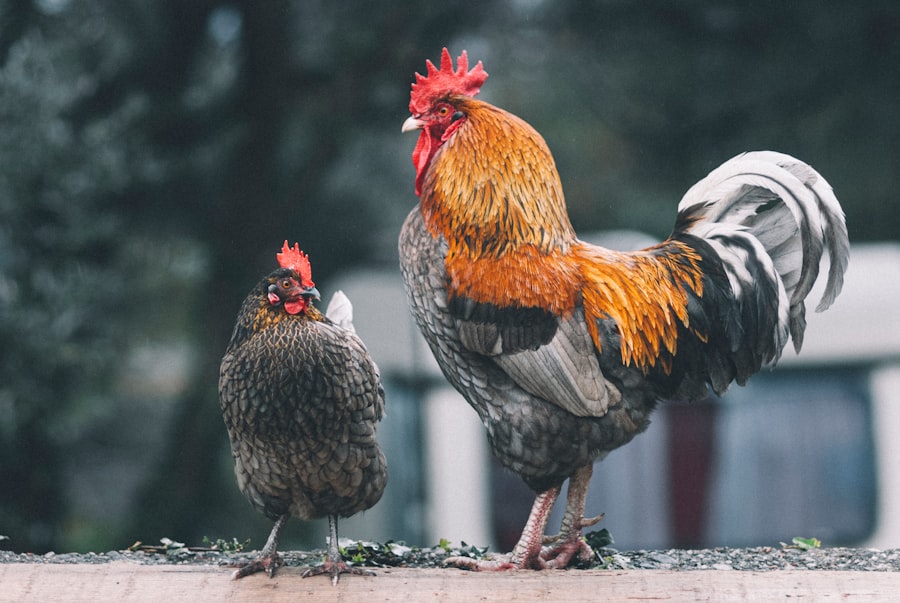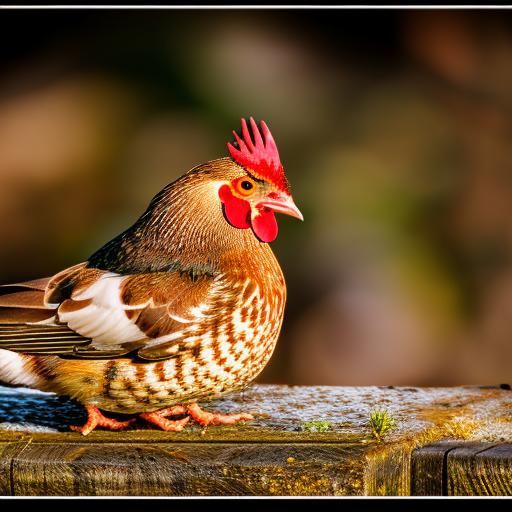Keeping chickens in the UK has become increasingly popular in recent years. Many people are drawn to the idea of having their own fresh eggs and enjoying the benefits of natural pest control in their gardens. However, it is important to understand the laws and regulations surrounding chicken keeping to ensure that you are compliant and avoid any legal issues. In this article, we will explore the laws and regulations surrounding chicken keeping in the UK, as well as provide tips on how to choose the right chicken coop, maintain a clean and safe environment for your chickens, and care for their health.
Key Takeaways
- Chicken keeping laws in the UK vary by region and it’s important to understand your local council’s regulations before starting.
- Keeping chickens can provide numerous benefits, including fresh eggs, natural pest control, and fertilizer for your garden.
- When choosing a chicken coop, consider factors such as size, ventilation, and predator protection.
- Building a chicken coop requires careful planning and consideration of factors such as location, materials, and design.
- Proper care and maintenance of your chicken coop, as well as regular health checks for your chickens, can help prevent common health issues.
Chicken Keeping Laws in the UK
In the UK, there are laws and regulations in place to ensure that chickens are kept in a safe and humane manner. These laws vary depending on where you live, so it is important to familiarize yourself with the specific regulations in your area. In general, you will need to obtain a permit or license to keep chickens, especially if you have more than a certain number of birds.
The specific requirements for permits and licenses can vary depending on factors such as the size of your property and the number of chickens you wish to keep. It is important to check with your local council or animal welfare authority to determine what permits or licenses you may need. Failure to comply with these regulations can result in fines or other legal consequences.
Understanding Your Local Council’s Regulations
To find out about your local council’s regulations on chicken keeping, you can start by visiting their website or contacting them directly. They may have specific guidelines or restrictions in place regarding the number of chickens allowed, coop requirements, and noise restrictions. It is important to contact your local council for clarification on any regulations that may not be clearly stated on their website.
Failure to follow local regulations can result in complaints from neighbors or even legal action. It is important to be a responsible chicken keeper and ensure that you are following all applicable laws and regulations. By doing so, you can enjoy the benefits of keeping chickens without causing any disruptions or issues in your community.
The Benefits of Keeping Chickens
There are numerous benefits to keeping chickens in your backyard. One of the most obvious benefits is the availability of fresh eggs. Chickens are prolific layers and can provide you with a steady supply of eggs for your family. Not only are these eggs fresh and delicious, but they also have a higher nutritional value compared to store-bought eggs.
Another benefit of keeping chickens is their ability to control pests in your garden. Chickens love to forage and will eat insects, slugs, and other pests that can damage your plants. This natural pest control can help reduce the need for chemical pesticides and create a healthier environment for your garden.
In addition to the practical benefits, keeping chickens can also have positive effects on your mental health. Caring for animals has been shown to reduce stress and anxiety, and chickens are no exception. Spending time with your chickens, observing their behavior, and taking care of their needs can be a therapeutic and rewarding experience.
Choosing the Right Chicken Coop
Choosing the right chicken coop is crucial for the health and well-being of your chickens. There are several factors to consider when selecting a coop, including size, material, and design.
The size of the coop will depend on the number of chickens you plan to keep. It is important to provide enough space for each chicken to move around comfortably and engage in natural behaviors such as scratching and dust bathing. A general rule of thumb is to allow at least 4 square feet of space per chicken inside the coop, and 10 square feet per chicken in the outdoor run.
The material of the coop is also important. It should be sturdy, predator-proof, and easy to clean. Common materials used for chicken coops include wood, plastic, and metal. Each material has its own advantages and disadvantages, so it is important to consider factors such as durability, insulation, and maintenance requirements when making your decision.
Factors to Consider When Building a Chicken Coop

If you decide to build your own chicken coop, there are several factors to consider to ensure that it is safe and comfortable for your chickens. The location of the coop is important for both the chickens’ well-being and your convenience. It should be placed in an area that is well-drained, protected from harsh weather conditions, and easily accessible for cleaning and maintenance.
Proper ventilation is also crucial for the health of your chickens. Good airflow helps remove moisture and ammonia from the coop, which can lead to respiratory issues if not properly managed. Windows or vents should be installed to allow fresh air to circulate while still protecting the chickens from drafts.
Building a secure and predator-proof coop is essential to protect your chickens from predators such as foxes, rats, and birds of prey. The coop should have sturdy walls, a secure door, and a roof that is resistant to predators. It is also important to bury wire mesh around the perimeter of the coop to prevent predators from digging under.
Maintaining a Clean and Safe Chicken Coop
Maintaining a clean and safe chicken coop is essential for the health of your chickens. Regular cleaning and maintenance tasks should be performed to prevent the buildup of waste, pests, and diseases.
Cleaning tasks include removing soiled bedding, replacing it with fresh bedding, and scrubbing the coop with a mild detergent or disinfectant. It is important to remove any uneaten food or treats from the coop to prevent attracting pests such as rats or flies.
In addition to regular cleaning, it is important to monitor the coop for signs of pests or diseases. Common signs of pests include mites or lice on the chickens’ feathers or skin, as well as droppings or damage to the coop. If you notice any signs of pests or diseases, it is important to take immediate action to prevent further infestation or spread of illness.
Feeding and Caring for Your Chickens
Feeding and caring for your chickens is an important part of keeping them healthy and happy. Chickens require a balanced diet that includes a combination of commercial feed, kitchen scraps, and fresh greens.
Commercial chicken feed is formulated to provide the necessary nutrients for chickens. It is important to choose a feed that is appropriate for the age and breed of your chickens. In addition to commercial feed, you can supplement their diet with kitchen scraps such as vegetable peels, fruit scraps, and cooked grains. It is important to avoid feeding them anything toxic or harmful, such as chocolate, onions, or avocado.
Clean water should always be available for your chickens. It is important to provide fresh water daily and ensure that the water container is clean and free from contaminants. Chickens also enjoy scratching and foraging for insects and greens, so it is beneficial to provide them with access to a secure outdoor run or allow them to free-range in a safe area.
Common Health Issues and How to Prevent Them
Chickens can be susceptible to various health issues, including mites, respiratory infections, and egg-laying problems. It is important to be aware of these common health issues and take steps to prevent them.
Mites are tiny parasites that can infest chickens’ feathers and skin, causing irritation and discomfort. Regularly inspecting your chickens for signs of mites, such as feather loss or redness on the skin, can help prevent infestations. Dusting the coop with diatomaceous earth or using natural remedies such as neem oil can help control mites.
Respiratory infections are another common health issue in chickens. These infections can be caused by bacteria or viruses and can lead to symptoms such as coughing, sneezing, and difficulty breathing. Good ventilation, proper hygiene, and vaccination can help prevent respiratory infections in chickens.
Egg-laying problems can also occur in chickens. These can include issues such as soft-shelled eggs, egg binding, or prolapse. Providing a balanced diet, ensuring proper lighting in the coop, and monitoring your chickens’ health can help prevent these issues. If you notice any abnormalities in your chickens’ egg-laying or behavior, it is important to seek veterinary care.
Is Keeping Chickens Right for You?
Keeping chickens can be a rewarding and enjoyable experience, but it also comes with responsibilities. Before deciding to keep chickens, it is important to consider the benefits and responsibilities involved.
By understanding the laws and regulations surrounding chicken keeping in the UK, choosing the right chicken coop, maintaining a clean and safe environment for your chickens, and caring for their health, you can ensure that you are providing a happy and healthy home for your feathered friends.
If you are interested in learning more about chicken keeping in the UK, there are several resources available. The British Hen Welfare Trust and the Royal Society for the Prevention of Cruelty to Animals (RSPCA) provide information on chicken welfare and offer guidance on how to keep chickens in a responsible and ethical manner.
In conclusion, keeping chickens in the UK can be a rewarding and fulfilling experience. By following the laws and regulations, providing a suitable coop, maintaining a clean and safe environment, and caring for their health, you can enjoy the benefits of fresh eggs, natural pest control, and the companionship of these charming creatures.
If you’re interested in keeping chickens in the UK, you may also want to check out this informative article on Poultry Wizard about A-Frame Chicken Coops. A well-designed coop is essential for the health and safety of your chickens, and an A-Frame design can provide a sturdy and efficient housing solution. This article provides detailed information on the benefits of A-Frame coops, including their space-saving design and ease of maintenance. To learn more about creating a comfortable and secure home for your feathered friends, click here: A-Frame Chicken Coop.
FAQs
What are the rules and regulations for keeping chickens in the UK?
In the UK, there are rules and regulations that govern the keeping of chickens. These rules cover issues such as the number of chickens that can be kept, the type of housing that is required, and the health and welfare of the birds.
Do I need planning permission to keep chickens in the UK?
In most cases, you do not need planning permission to keep chickens in the UK. However, if you live in a conservation area or a listed building, you may need to seek permission from your local council.
How many chickens am I allowed to keep in the UK?
The number of chickens that you are allowed to keep in the UK depends on the size of your garden and the type of housing that you have. Generally, you can keep up to six chickens without needing to apply for a license.
What type of housing do I need for my chickens?
In the UK, you need to provide your chickens with a suitable and secure housing. The housing should be large enough to accommodate the number of birds that you have and should provide protection from predators and the weather.
Do I need to register my chickens with the government?
If you have more than 50 chickens, you need to register your birds with the government. This is to help prevent the spread of disease and to ensure that the birds are properly cared for.
What are the health and welfare requirements for keeping chickens in the UK?
In the UK, there are strict health and welfare requirements for keeping chickens. These include providing the birds with a suitable diet, access to clean water, and appropriate veterinary care. You also need to ensure that the birds are kept in a clean and hygienic environment.
Meet Walter, the feathered-friend fanatic of Florida! Nestled in the sunshine state, Walter struts through life with his feathered companions, clucking his way to happiness. With a coop that’s fancier than a five-star hotel, he’s the Don Juan of the chicken world. When he’s not teaching his hens to do the cha-cha, you’ll find him in a heated debate with his prized rooster, Sir Clucks-a-Lot. Walter’s poultry passion is no yolk; he’s the sunny-side-up guy you never knew you needed in your flock of friends!







